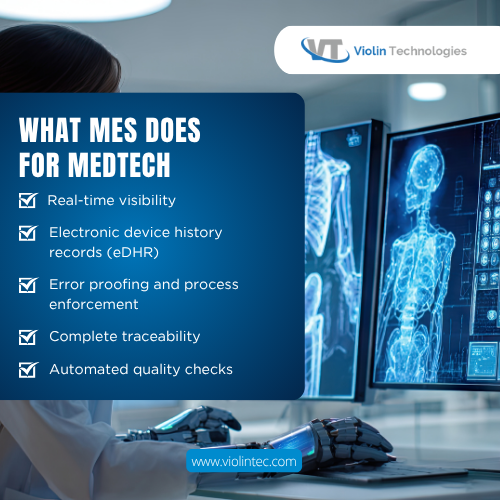This evolution in manufacturing doesn’t happen by accident. At the center of this transformation is MES (Manufacturing Execution System) integration, which quietly reshapes the way MedTech manufacturers operate.
But MES isn’t just another software buzzword. It’s becoming the backbone of compliance-driven industries like MedTech, especially for companies that take quality seriously, like an ISO 13485 certified electronics manufacturer, for delivering life-saving products.
In this blog, let’s unpack why MES matters, how it strengthens compliance, and why contract manufacturers building medical devices can’t afford to ignore it anymore.
Why MedTech Manufacturing Needs More Than Just “Good Processes”
Medical device manufacturing is one of the most regulated industries in the world. Every sensor, PCB, catheter, or wearable health device has to be produced with uncompromising precision. And unlike commercial electronics, the margin of error here is zero.
- Auditors expect
- Complete traceability
- Flawless documentation
- Evidence of controlled processes
- Real-time oversight
- Consistent quality
Traditionally, manufacturers rely on SOPs, paper-based records, and manual supervision. But as devices get more complex and regulatory expectations, these approaches simply can’t keep up.
This is where MES becomes a game-changer.
What MES Really Does for MedTech
MES integrates the entire production ecosystem from machines to human operators and turns every action into real-time, verifiable, traceable steps.
Here’s what that means in practical terms:
1. Real-Time Visibility Across Every Operation
Instead of guessing what’s happening on the shop floor, leaders get a live dashboard of:
- Production status
- Machine performance
- Material usage
- Operator compliance
- In-process quality controls
For contract manufacturing partners juggling multiple client projects, this real-time oversight keeps everything predictable and error-free.
2. Electronic Device History Records (eDHR)
No more missing signatures or messy binders.
MES automatically captures:
- Component serials
- Operator IDs
- Equipment used
- Time stamps
- Process parameters
- QC approvals
This creates an FDA-ready, audit-proof eDHR that saves weeks of manual effort.
3. Error-Proofing and Process Enforcement
MES ensures that:
- Only trained operators run specific processes.
- Correct materials are scanned before using them.
- Each step is completed in the right sequence.
- Machines auto-adjust for validated parameters
For ISO 13485 compliance, this level of process discipline is priceless.
4. Complete Traceability from Raw Material to Finished Device
Traceability isn’t optional in MedTech—it’s mandatory.
MES tracks:
- Lot numbers
- Supplier data
- Process history
- Environmental conditions
- Test results
If a device fails in the field, MES lets you trace the root cause in minutes, not days.
5. Automated Quality Checks
With MES, quality isn’t just inspected at the end; it’s monitored continuously.
Automated triggers ensure:
- QC holds when parameters drift.
- Preventive maintenance alerts
- Deviations are documented instantly.
- Non-conformances follow standardized workflows.
This drastically reduces defects and recalls.

How MES Strengthens ISO 13485 Compliance
For contract medical device manufacturers , MES acts as a compliance partner.
Here’s how it supports the core principles of ISO 13485:
✔ Document Control
All SOPs, WI, and QMS documents are stored digitally and accessed only by authorized personnel.
✔ Risk Management
MES collects historical data, enabling proactive risk identification and mitigation.
✔ Validation and Verification
Process steps are validated once, then locked and enforced automatically.
✔ CAPA Handling
MES can trigger automatic CAPA (corrective action and preventive action) workflows when deviations occur.
✔ Audit Preparedness
Instead of scrambling before audits, manufacturers can generate electronic records instantly.
This not only impresses auditors; it builds trust with OEMs and healthcare providers.
MES Integration: A Competitive Advantage for Contract Manufacturers
MedTech OEMs carefully select their contract manufacturing partners. The industry is shifting from “cheapest vendor” to “most compliant and reliable partner.”
Integrating MES gives contract manufacturers a powerful edge:
1. Faster Time-to-Market
No delays due to paperwork, rework, or repeated validations.
2. Greater Transparency for Customers
OEMs can track progress in real time, improving trust and collaboration.
3. Reduced Cost of Quality
Fewer defects, fewer recalls, and fewer manual interventions mean higher profitability.
4. Higher Scalability
When processes are digital and consistent, scaling becomes smoother.
5. Stronger Customer Confidence
OEMs naturally prefer ISO 13485 Certified Contract Manufacturing Company that also invests in MES for quality assurance.
To illustrate these advantages in a practical setting, consider the following real-world scenarios.
You’re producing 10,000 units of a wearable cardiac monitor. Suddenly, your QC team notices an abnormal variation in one batch.
Without MES? You’d spend days digging through paperwork and trying to trace the material source.
With MES?
You can pull up:
- The exact lot number of components
- Operators on shift
- Machines used
- Calibration data
- Environmental conditions
- Testing results
All in a few seconds.
You isolate the issue, resolve it, and prevent a full-scale recall.
That’s the power of MES- risk reduction at scale.
The Future of MedTech Manufacturing Is Digital
Regulatory bodies are already encouraging paperless, traceability-driven manufacturing. As devices become more connected and intelligent, the expectations from contract manufacturers will rise even higher.
MES isn’t just a tool—it’s a foundation for:
- Smart manufacturing
- Automated compliance
- Predictive maintenance
- Connected device production
- Zero-defect manufacturing
In the coming years, MedTech companies that don’t adopt MES may struggle to keep pace with the rising tide of compliance demands.
Final Thoughts
MES is quickly becoming indispensable for MedTech manufacturers who want to stay competitive, compliant, and audit ready. For any ISO 13485 certified electronics manufacturer or a growing ISO 13485 Certified Contract Manufacturing Company, integrating MES is more than an upgrade—it’s a strategic move that shapes long-term success.
It simplifies quality control, strengthens compliance, and gives customers confidence in every device you build.
If quality is your promise, let MES be your cornerstone for delivering it. Invest in your future and lead the way in MedTech manufacturing.

